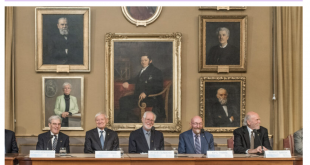Nature of the Health Crisis The current health crisis has similarities to the Great Recession of 2008-2009, though fundamentally different. The crisis ten years ago resulted from collapse of financial institutions, a purely human-made disaster whose solution should have been obvious. The financial collapse provoked a severe contraction in...
Read More »Lessons to be learnt
This is the first of two posts on the current crisis by Professor Massimo Amato, of Bocconi University, Milan. Well before the health emergency is over, the coronavirus crisis has already begun to produce devastating effects on the economy. This happens not only because the only accepted strategy, that of a lockdown, involves a strong slowdown in economic activity, but because the exposure of the economic system to expectations is such that the medium-term effects are so...
Read More »Rethinking Britain: the fundamental choice we face on December 12th
At stake in December’s General Election in December is much more than just Brexit, though Brexit in the form proposed would be damaging enough. It is a fundamental choice of the kind of society we want to develop. In September, “Rethinking Britain: Policy Ideas for the Many”, was published, of which I was co-editor. The book brings together the...
Read More »The non-existence of society and the ideology of neoclassical economics
In the United Kingdom we face the imminent likelihood of an election in which the political choices before voters will be in clear focus, remaining within the European Union or leaving (perhaps under disastrous conditions); social democracy or deregulated capitalism; saving the environment or further destruction of it; parliamentary democracy or authoritarianism. In the context of these momentous decisions, and with Parliament prorogued again, we should reflect on a still...
Read More »How the sexist ‘Nobel Prize’ in economics has warped the world
The following hastily written piece appeared in Left Foot Forward on 25th September, 2019.The Nobel Memorial Prize in Economics will be 50 years old next month. One thing unites all its winners, bar one: they have all been male.This is not just an affront to equality. In overlooking brilliant female economists, the Swedish Central Bank’s Nobel has neglected economic theory which could have helped prevent the turmoil of regular financial shocks and political trauma.The...
Read More »Balance of Power: The Economic Consequences of the Peace at 100
My review of John Maynard Keynes’s The Economic Consequences of the Peace Macmillan (2019) appeared in Nature – the International Journal of Science – on 23 September, 2019.“Ann Pettifor finds astonishing contemporary resonance in John Maynard Keynes’s critique of globalization and inequity.”The Economic Consequences of the Peace John Maynard Keynes Macmillan (2019)In December 1919, John Maynard Keynes published a blistering attack on the Treaty of Versailles, signed in...
Read More »The metaphors of economics and austerity
Fixing the roof whle the sun shines? (Photo: Jeremy Smith) This post was written as introduction to the very recently published book “Discourse Analysis and Austerity: Critical Studies from Economics and Linguistics”, edited by Kate Power, Tanweer Ali and Eva Lebdušková. Published by Routledge, it is...
Read More »Why the left must now unite against Brexit
The Berlaymont building, Brussels HQ of the European Commission, refracted. Image copyright Jeremy Smith This article is cross-posted from Open Democracy, first published 17th January 2019. It follows up his earlier article from December, “Labour's Brexit trilemma: in search of the least bad...
Read More »To Secure a Future, Britain Needs a Green New Deal
This is an extract from a chapter in Economics For the Many (Verso, 2018) edited by Rt. Hon. John McDonnell MP. The chapter was written in August, 2017. If we are to secure a sustainable, stable and liveable future for the people of Britain, then implementation of the Green New Deal will be vital. Not just for the sake of the ecosystem, but also for the sake of rebuilding a stable, sustainable economy. The era of procrastination, of half measures, of soothing and baffling...
Read More »Time to restore the revolutionary Keynes
John Maynard Keynes - for the Times Literary Supplement It was his internationalism, together with his insights into the functioning of the world’s financial architecture that first drew me to the work of John Maynard Keynes. His genius is, perhaps, most comparable to that of Charles Darwin. But whereas Darwin is widely recognized for developing the science of evolution, Keynes’s development of the science of macroeconomics goes largely unacknowledged by a profession still...
Read More » Heterodox
Heterodox





